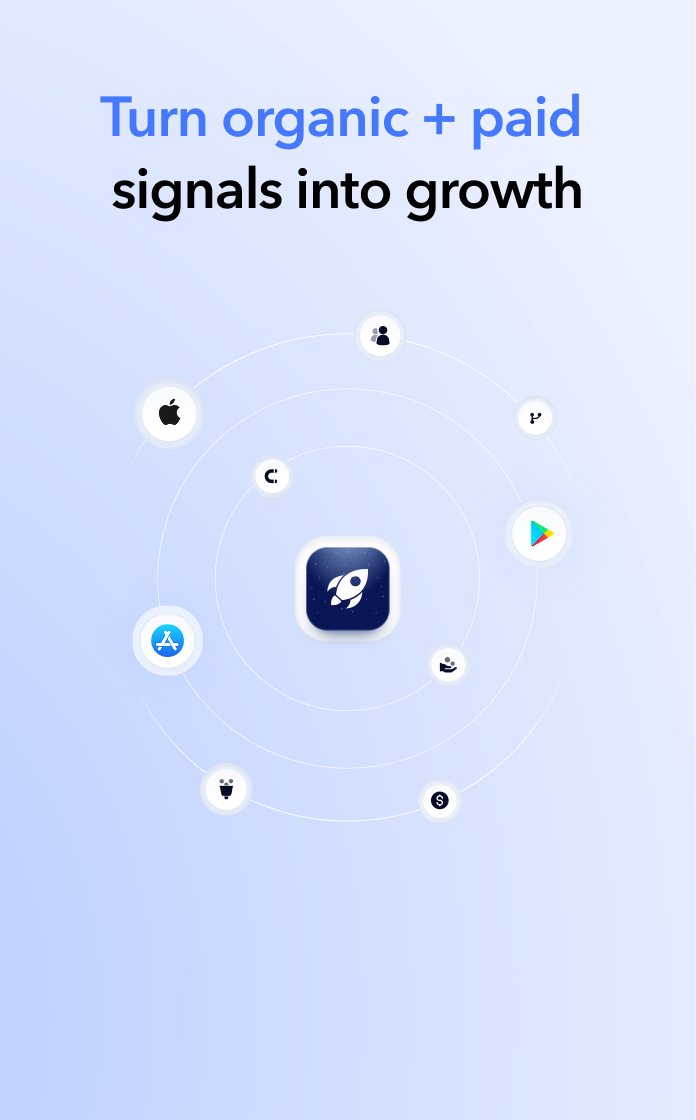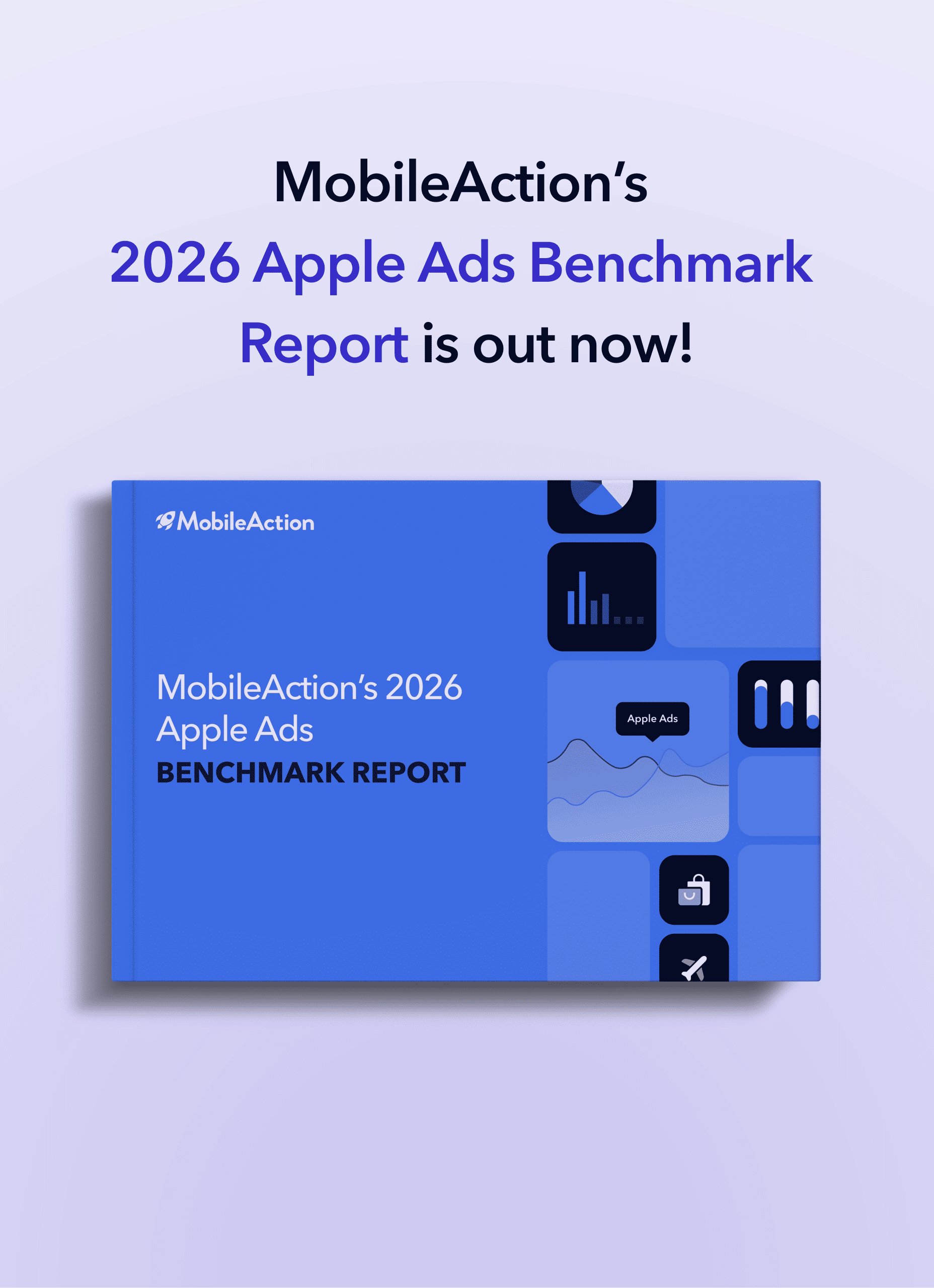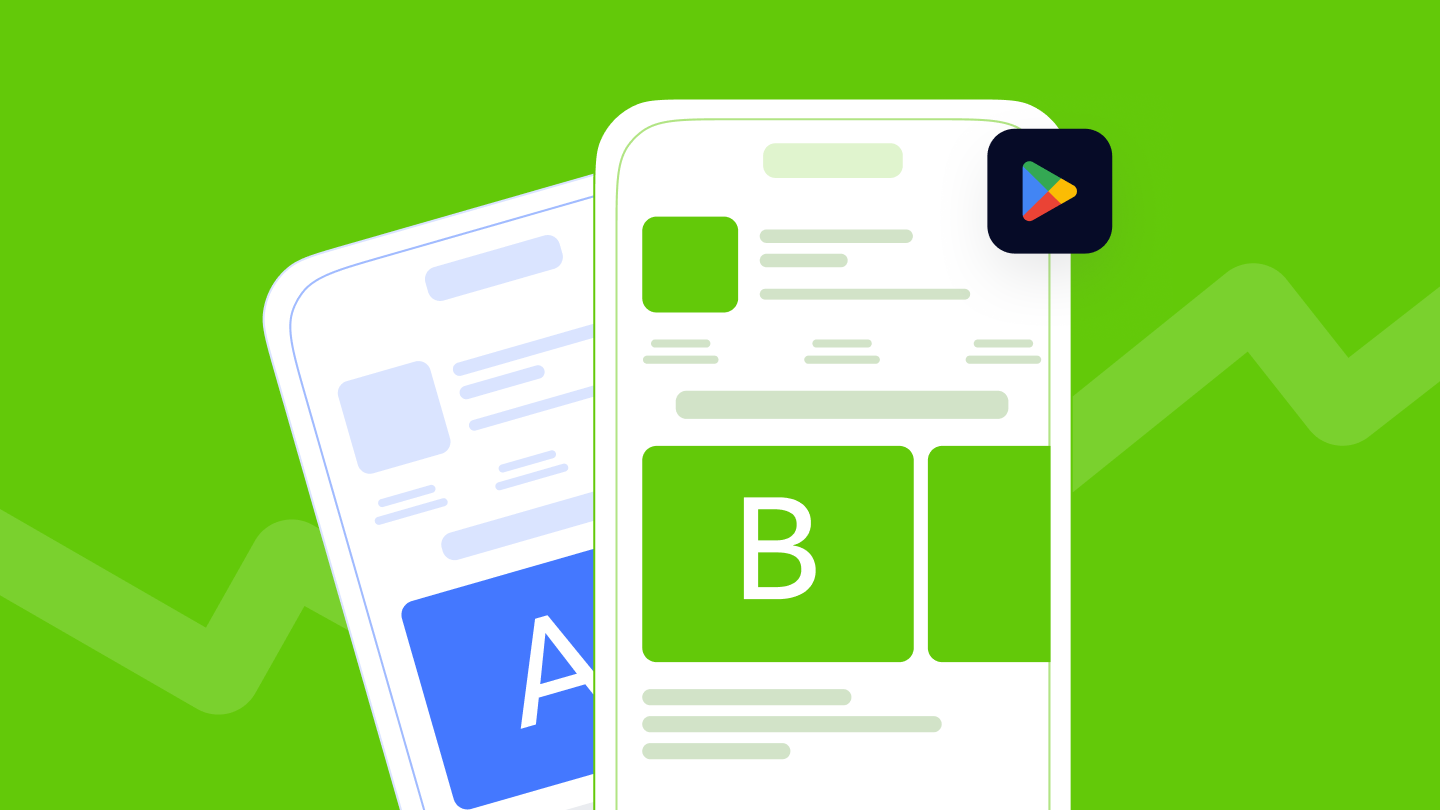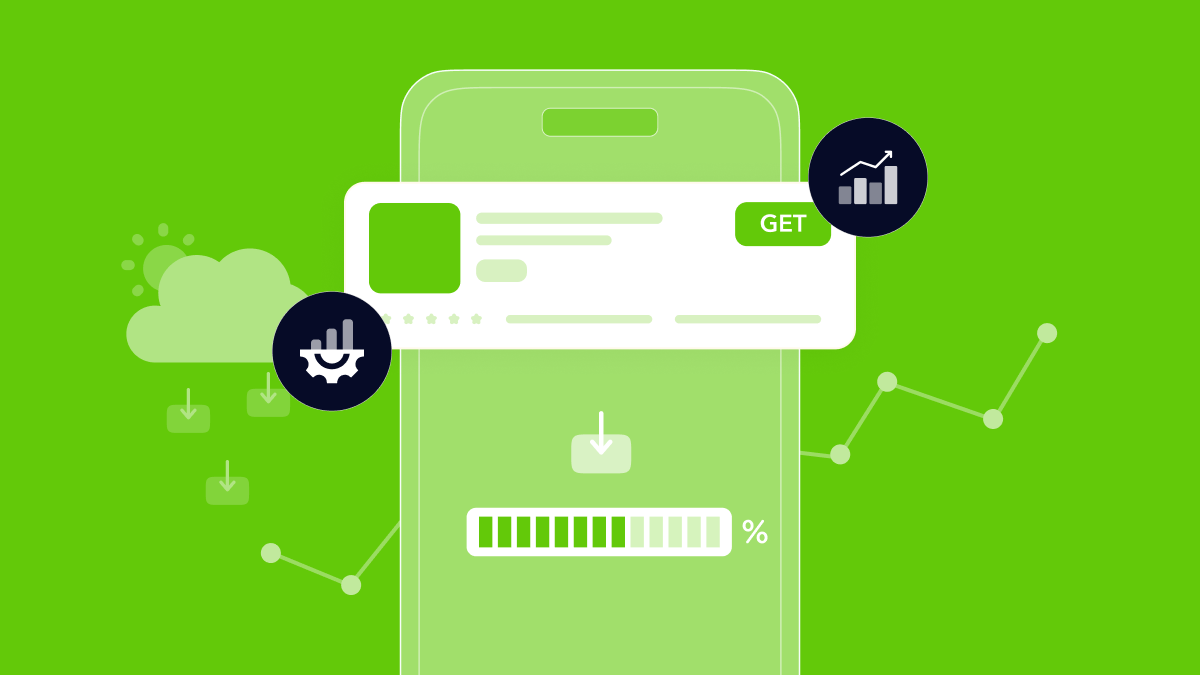Looking to boost your app's visibility and acquire more users? Our 2025 ASO Report is your ultimate guide to navigating the evolving app store landscape. Packed with data-driven insights, keyword trends, and top-ranking app strategies, this report will equip you with the knowledge to optimize your app's presence and achieve organic growth.
App Store Optimization (ASO) is essential for getting your app noticed, but not everyone plays fair. In the race to the top of app store rankings, some developers turn to black hat ASO, a set of shady tactics that promise quick wins at the expense of ethics and long-term success.
These underhanded methods violate app store guidelines and can undermine user trust. In this blog post, we’ll explore what black hat ASO is, the common black hat tactics to watch out for, why blackhat ASO ultimately backfires, and how you can achieve sustainable app growth without resorting to the dark side.
Modern app marketers need to understand where legitimate ASO ends and “black hat” begins. By knowing the tricks some apps use to cheat the system, you can avoid accidental missteps and outsmart shady competitors with ethical, data-driven strategies. Let’s shine a light on the dark side of app store optimization and see how to win the right way.
What Is Black Hat ASO?
Black hat ASO refers to unethical and manipulative techniques used to artificially inflate an app’s visibility and ranking in the app stores. In other words, these are “cheating” methods that break the rules set by App Store and Google Play to gain an unfair advantage.
Black hat tactics often involve violating app store guidelines, either by boosting your own app’s metrics through fake means or undermining competitors with sabotage. The goal is a quick jump in rankings or downloads, but any gains come at a high cost.
Legitimate “white hat” ASO, by contrast, focuses on improving app quality, relevance, and user experience to grow organically within the rule. Black hat ASO sacrifices those principles for short-term results. Examples include things like buying fake reviews, stuffing keywords, or using bots for installs (we’ll get into specific tactics shortly).
Importantly, black hat ASO tactics breach the terms of service of the app platforms and erode the integrity of the app ecosystem. They may provide a temporary boost, but they carry significant risks, including app suspension, bans, and damage to your reputation.
Black Hat ASO Tactics
Let’s break down some of the most common black hat tactics in app store optimization. These are practices you should avoid at all costs, even if you see competitors trying them. Not only do these techniques violate Apple’s and Google’s policies, but they can also result in severe penalties if you get caught. Common black hat ASO tactics include:
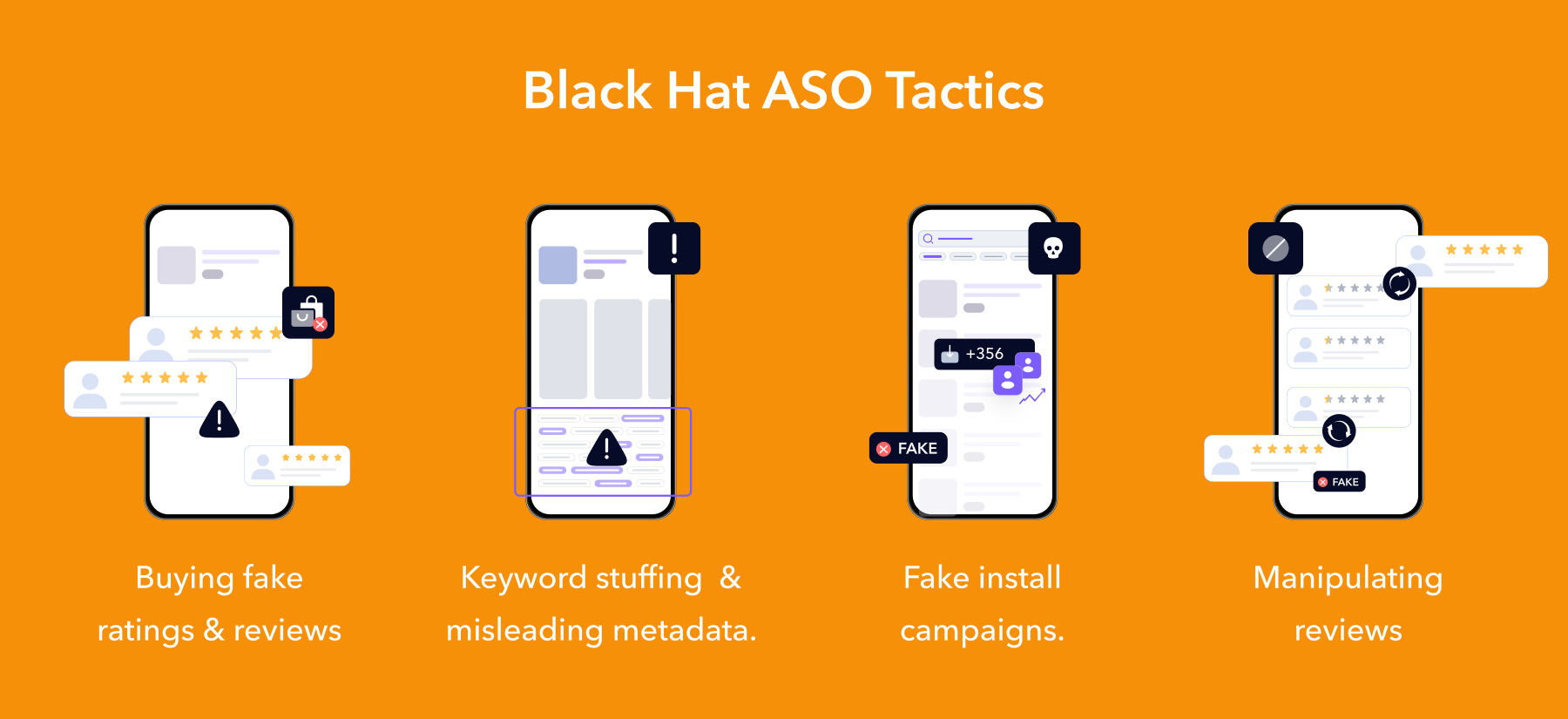
-
Buying fake ratings & reviews
This is one of the most prevalent black hat methods. Developers will purchase positive app store reviews or star ratings from third-party services to make their app look more popular and high-quality than it really is. There are entire marketplaces where one can buy packages of 5-star reviews or upvotes. Needless to say, this is strictly against the rules. While buying ratings might give a short-term bump, both Apple and Google have gotten better at detecting and removing fraudulent feedback. Getting caught could wipe out your hard-earned real reviews or even get your app removed.
-
Keyword stuffing & misleading metadata
This tactic involves overloading your app’s title, subtitle, or description with keywords, including irrelevant or trendy terms, in an attempt to rank for more searches. For example, a photo editor app might stuff dozens of unrelated keywords or even competitor app names into its description to appear in more results. Keyword stuffing violates app store metadata guidelines. Users could be turned off by a keyword-stuffed description, and they’ll likely bail if the app doesn’t match the buzzwords. Both stores scan app metadata for this kind of manipulation, so the gains are not worth the risk of a keyword-stuffed app getting flagged or down-ranked.
-
Fake install campaigns
Another popular black hat approach is artificially inflating your download numbers or search ranking through fake installs. This can be done by paying bot networks or real users en masse to download your app, sometimes targeting a specific keyword. For instance, some marketers run “keyword install” campaigns where they ask thousands of users (often via incentivized ad networks or click farms) to search for a particular keyword and download the app, tricking the algorithm into ranking the app higher for that keyword. Others simply purchase bulk installs directly
-
Manipulating reviews
Beyond just buying reviews, some black hat practitioners try to manipulate which reviews are most visible on an app’s page. On App Store, for example, users can long-press a review and mark it as “Helpful.” By upvoting their own positive, keyword-rich reviews (or downvoting truthful negative ones), a developer can hack the system to make their best reviews float to the topr. This gives new viewers a skewed impression of the app’s reception. This trick is relatively subtle but still unethical; it’s essentially gaming the review sorting. Similarly, on Google Play, one could attempt to mass-“like” certain reviews. These actions undermine the integrity of user feedback. While not as easily detectable as outright fake reviews, they still carry risk if patterns emerge (for instance, a cluster of accounts only ever marking one app’s reviews as helpful). It’s a line that legitimate developers should not cross.
To learn more about how to manage app store reviews, check out our guide titled How to respond to app store reviews the right way in 2025
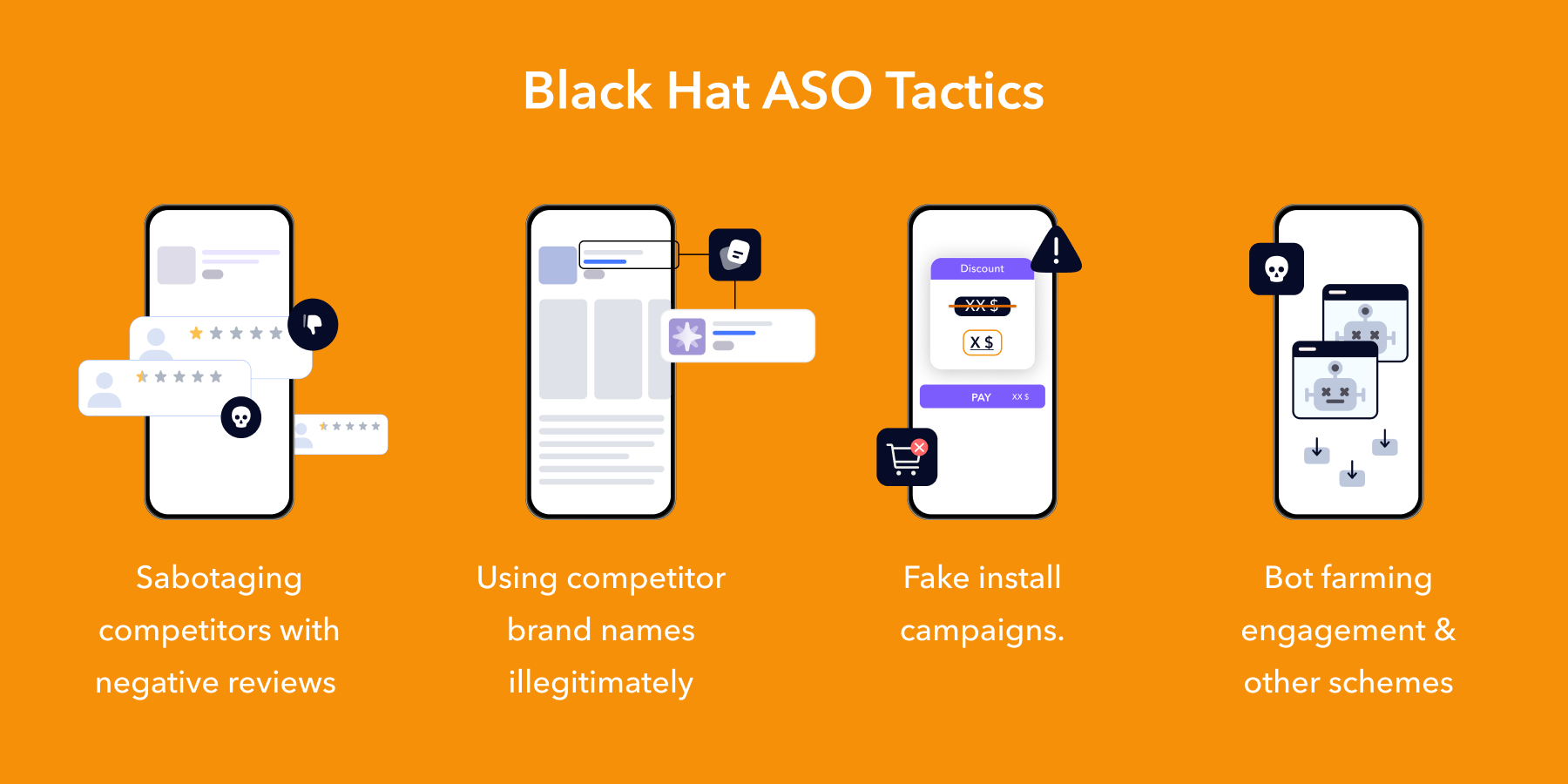
-
Sabotaging competitors with negative reviews
Perhaps the ugliest black hat tactic is attacking rival apps by flooding them with 1-star ratings or bad reviews. The idea is simple: if you can’t easily overtake a competitor, try to drag them down. A barrage of low ratings can hurt an app’s ranking and deter potential users who judge by the stars. Some unscrupulous developers will pay for services to post negative reviews on competing apps. This not only harms the victim’s app reputation but also misleads users. It’s essentially the app store equivalent of defamation.
-
Using competitor brand names illegitimately
Inserting well-known competitor names or popular app titles into your keyword field or description is another manipulative strategy. For example, a small puzzle game might sneak the keyword of a top-tier game (like “Candy Crush”) into its metadata to appear in those search results. This deceptive practice misleads users who search for the famous app and find unrelated apps piggybacking on the name. Both main app stores prohibit using irrelevant or trademarked terms in your app listing. If you violate this, your app can be rejected or delisted.
-
Bait-and-switch with subscription pricing
Some developers resort to a bait-and-switch scheme on pricing to boost installs and revenue. This involves initially setting very low subscription prices or generous free trials to attract a lot of users (and potentially climb the “Top Grossing Apps” or trending charts as users sign up in droves), then later dramatically increasing the price via app updates once a user base is locked in. This tactic is more about monetization mischief than search ranking, but it’s considered a “dark pattern” related to ASO because the initial low price can inflate download and revenue metrics, tricking the algorithms.
-
Bot farming engagement & other schemes
The list goes on as black hatters are creative. Some use automated bot traffic to simulate user engagement (e.g., bots that open the app daily, to boost “active user” stats or retention metrics). Others coordinate mass incentive campaigns outside the app stores to manipulate being featured or charted. There have even been attempts to manipulate Top Charts rankings by coordinating massive installs or spending in a short window (for instance, mass purchases to briefly push an app into the Top Grossing chart). These schemes are often short-lived hacks; app store algorithms continuously adjust to prevent unnatural patterns. Google and Apple employ advanced fraud detection systems that notice unusual spikes or behaviors that don’t align with normal user patterns. If an app’s numbers look too good to be true, chances are the platform will investigate.
In summary, black hat ASO tactics might get you a momentary win, but they’re playing with fire. The app stores are constantly improving their defenses, and they do catch and punish violators. Even worse, these tactics can ruin your credibility with real users.
The bottom line
Black hat ASO may seem tempting to app developers who want fast results, but it’s a trap. The dark side of app store optimization is filled with volatility, penalties, and broken trust. Sustainable success comes from playing by the rules, understanding how the app stores operate, investing in high-quality products and marketing, and leveraging data to make continual improvements.
In the end, the apps that win are those that delight users, not deceive platforms. Stay on the right side of ASO, and you’ll find that you can compete without any gimmicks. Remember, every minute spent trying to game the system is a minute you could have spent making your app or your ASO strategy better.
Choose the path of long-term, ethical growth. Your users will thank you, and so will your bottom line.
One of the best ways to succeed without black hat tactics is to arm yourself with powerful ASO tools and data. This is where MobileAction’s ASO Intelligence platform comes in. MobileAction provides a suite of tools designed to help app marketers optimize effectively and ethically, so you never even feel tempted to resort to shortcuts.
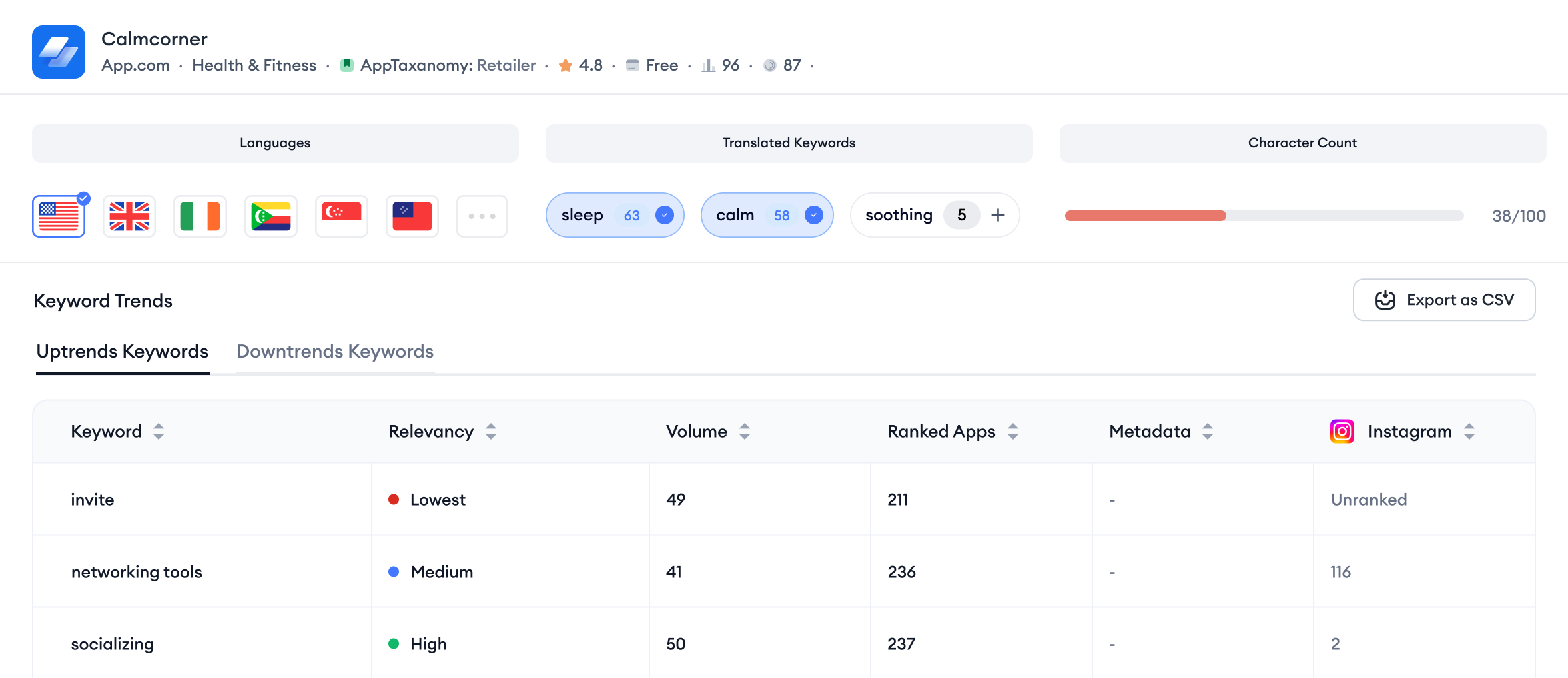
What can ASO Intelligence do for you? In a nutshell, it gives you deeper market intelligence, keyword insights, and performance monitoring that enable smarter decisions. You can research the best keywords for your app and track how you rank for them over time, ensuring you focus on terms that drive real value. The platform offers competitor analysis, so you can see what strategies other successful apps are using (from their keywords to their creatives) and learn from them.
With these insights, you can craft a data-driven optimization plan, whether that’s updating your metadata, trying new icon designs, or targeting a new niche, all based on evidence, not guesswork. By using these features, you ensure that every improvement you make is grounded in solid data, not risky gimmicks.
Why gamble on shady tactics when you can outsmart competitors with better information and legitimate optimization?
Ready to boost your app’s visibility the right way? Sign up today and start strengthening your ASO strategy with MobileAction’s ASO Intelligence.















